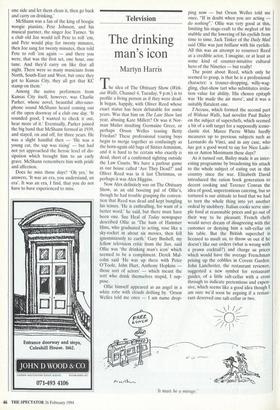Television
The drinking man's icon
Martyn Harris
The idea of The Obituary Show (With- out Walls, Channel 4, Tuesday, 9 p.m.) is to profile a living person as if they were dead. It began, happily, with Oliver Reed whose exact status has been debatable for some years. Was that him on The Late Show last year, abusing Kate Millett? Or was it Nor- man Mailer insulting Germaine Greer, or perhaps Orson Welles teasing Betty Friedan? These professional roaring boys begin to merge together as confusingly as the born-again old bags of Sixties feminism, and it is hard to be certain who exactly is dead, short of a confirmed sighting outside the Law Courts. We have a parlour game in our house called 'Are They Dead?' and Oliver Reed was in it last Christmas, or perhaps it was Alex Higgins.
Now Alex definitely was on The Obituary Show, as an old boozing pal of 011ie's, though he had trouble grasping the conven- tion that Reed was dead and kept bungling his tenses. 'He is enthralling, for want of a better word,' he said, but there must have been one. Sue Heal of Today newspaper described 011ie as 'The ham of Hammer films, who graduated to acting, rose like a sky-rocket in about six movies, then fell ignominiously to earth.' Gary Bushell, my fellow television critic from the Sun, said 011ie was 'the drinking man's icon' which seemed to be a compliment. Derek Mal- colm said 'He was up there with Peter O'Toole, John Hurt, Anthony Hopkins — those sort of actors' — which meant the sort who drink themselves stupid, I sup- pose.
011ie himself appeared as an angel in a white robe with clouds drifting by. 'Orson Welles told me once — I am name drop- ping now — but Orson Welles told me once, "If in doubt when you are acting — do nothing".' 011ie was very good at this, limiting his stage-craft to the neglect of his stubble and the lowering of his eyelids from time to time. Jack Tinker of the Daily Mail said 011ie was just brilliant with his eyelids. All this was an attempt to resurrect Reed as a credible actor, I imagine, or at least as some kind of counter-intuitive cultural hero of the Nineties — but really!
The point about Reed, which only he seemed to grasp, is that he is a professional character: a trouser-dropping, willy-wag- gling, chat-show tart who substitutes irrita- tion value for ability. His chosen epitaph was 'He made the air move', and it was a suitably flatulent one.
J'Accuse, which formed the second part of Without Walls, had novelist Paul Bailey on the subject of superchefs, which seemed a bit of a soft target for a supposedly icono- clastic slot. Marco Pierre White hardly measures up to previous subjects such as Leonardo da Vinci, and in any case, who has got a good word to say for Nico Lade- nis or Anton Mosimann these days?
As it turned out, Bailey made it an inter- esting programme by broadening his attack to the whole subject of eating out in this country since the war. Elizabeth David introduced the ration book generation to decent cooking and Terence Conran the idea of good, unpretentious catering, but so tortured is our attitude to food that we had to turn the whole thing into yet another ordeal by snobbery. Italian cooks serve sim- ple food at reasonable prices and go out of their way to be pleasant; French chefs would never dream of disagreeing with the customer or denying him a salt-cellar on his table. But the British superchef is licensed to insult us, to throw us out if he doesn't like our orders (what is wrong with a prawn cocktail?) and charge us prices which would have the average Frenchman prising up the cobbles in Covent Garden. John Lanchester, the restaurant reviewer, suggested a new symbol for restaurant guides, of a little salt-cellar with a cross through to indicate pretentious and expen- sive, which seems like a good idea though am sure we'd soon be arguing if a restau- rant deserved one salt-cellar or two.
'It must be a mirage.'


























































 Previous page
Previous page